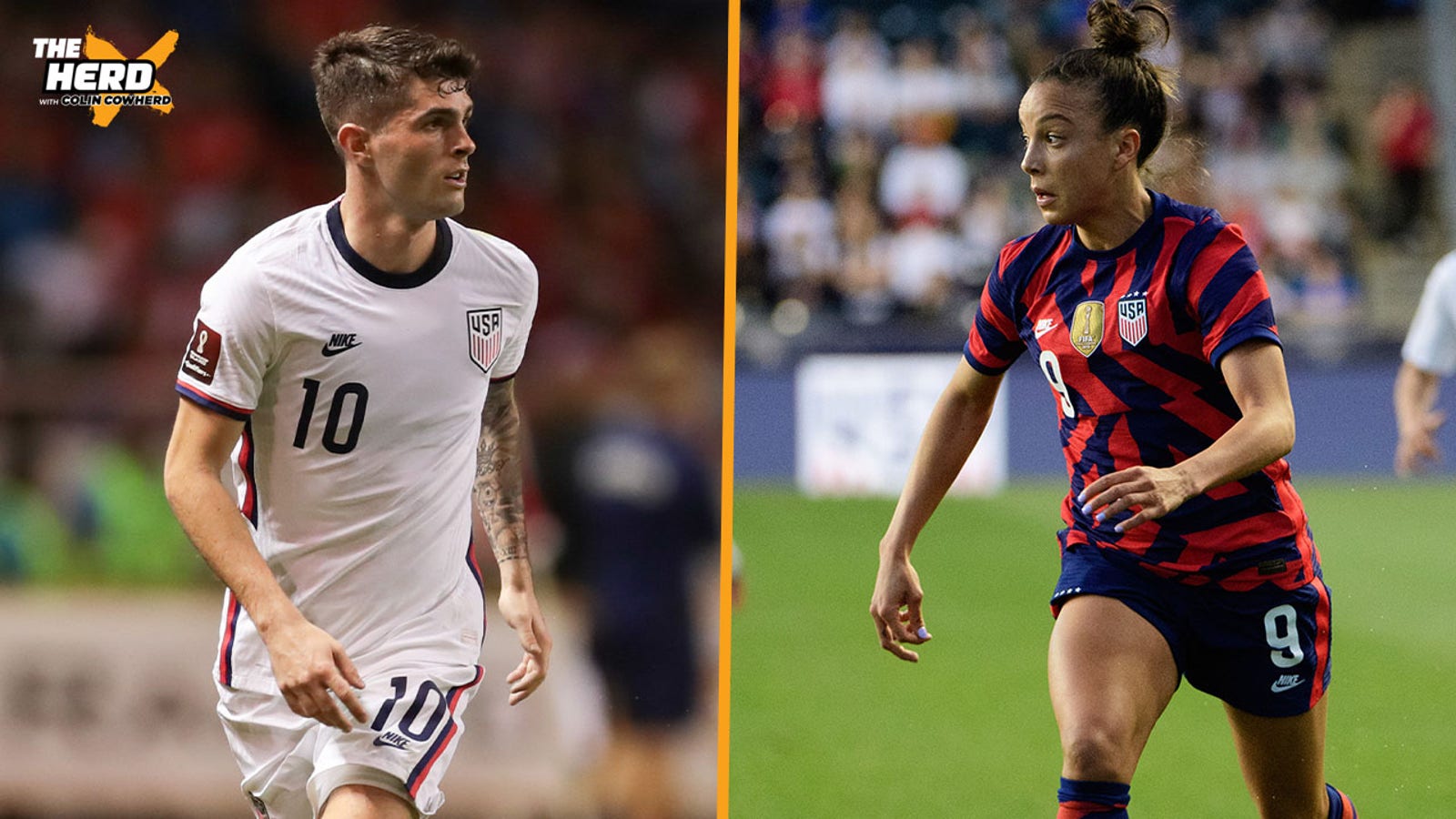
What the new U.S. Soccer CBA means for everyone involved
By Doug McIntyre and Laken Litman
FOX Sports Soccer Writers
The landmark equal pay agreement announced Wednesday by U.S. Soccer and its men’s and women’s national teams is remarkable for many reasons, not least the concessions all three sides made to get this historic deal done.
Here are three quick thoughts on how it happened and what it means for everyone involved.
The USWNT’s biggest win yet
For more than three decades, the Americans have been the global standard-bearer of women’s soccer, if not all of women’s sports.
Their sustained dominance at the international level — four World Cup titles, including the inaugural event in 1991; the watershed 1999 triumph at a sold-out Rose Bowl; back-to-back wins at the past two tournaments; four Olympic gold medals since 1996 — has captured the imagination of mainstream sports fans in the United States.
Over time, that gave the USWNT the leverage they needed to force the federation to devote even more resources to both the team and the women’s game in the U.S. at large.
But this might be their most significant and historic victory yet.
"I’ve been in this equal pay fight for over 20 years, first as a player and now at U.S. Soccer," current USSF president and former USWNT player Cindy Cone said. "I want to give a lot of credit to both the men’s and women’s teams and their [players' associations]. This wouldn’t have been possible if we weren’t able to get all three groups at the table.
"This is just a really historic moment that will hopefully lead to meaningful changes and progress not only here at home in the U.S. but around the world. And I think this will not only impact soccer, but it will impact sport in general, as well as society."
The USWNT’s previous CBA, which was ratified in 2017, ensured that the women would finally be on even footing with the men when it came to things like hotel accommodations and travel. It also included things the men, who earn the bulk of their income from their clubs, didn’t get, such as guaranteed base salaries.
What it didn’t do was equalize the World Cup prize money paid by FIFA. The USSF long contended that it didn’t control those funds and that its hands were tied. But the women didn’t relent and sued the federation on the eve of the 2019 World Cup in France. Most of their case was dismissed by a federal judge a year later, but they won in the court of public opinion. That, along with the support from the USMNT, ultimately led to the USSF changing its position on the FIFA cash.
Still, the USWNT had to give to get. While the new CBA does ensure that the team will share "an equal percentage of the collective prize money paid by FIFA for the teams’ participation and performance in their respective World Cups" through 2027, according to the official press release, U.S. Soccer will no longer pay the women’s players a salary.
The fed also won’t underwrite the NWSL salaries of national team players, as it did under the previous pact. That’s not nothing.
Other key aspects in the agreement include benefits for both teams, including a 401K and childcare (the women have had parental benefits at national team training camps and matches in the past, and now the men will, too), fair working conditions (gone are the days of the women playing on artificial turf) and similar travel budgets (equal number of charter flights and hotel accommodations). U.S. Soccer will also share a portion of its commercial revenues from broadcast rights, corporate sponsorships, ticket sales, etc.
Give the USMNT credit, too
While there were plenty of contributing factors, the U.S. men played a huge role in getting this deal done. U.S. Soccer faced a unique moment in time when the men’s contract was up and the women’s contract was up for renewal. This presented an opportunity to get everybody in the same room and both CBAs on the same timeline, which had never happened in the past.
"This advancement doesn’t happen without the men championing this," Cone said. "I just felt like that was really important, and I don’t want that to be understated because they were true champions and worked through this. It’s not easy to give up the money they are giving up and to know it’s the right thing to do and then step up and do it. I think they should be applauded."
Now the USWNT players have the ability to make more money, while the USMNT could make less. The men could’ve gone their own way following the 2020 ruling in favor of U.S. Soccer, so why stay engaged and agree to this deal?
"We saw there was not going to be a way forward to a deal without equalization of World Cup prize money," said defender and USMNT players' association leadership group member Walker Zimmerman. "We looked at the numbers, and we recognized that, you know, sure, there was a potential chance of making less money, no doubt about it. But we also believe so much in the women’s team. We believe in the whole premise of equal pay, and ultimately that was a big driving force for us. To do something historic, do something that no other team had done before and really try to do this together."
U.S. Soccer, USWNT, USMNT agree to historic equal pay deal
In the end, they agreed to pool their World Cup bonuses. That's no small thing, given how much more prize money FIFA allots for the men: $440 million at the 2022 World Cup compared to $60 million for the women at next year’s event in Australia and New Zealand.
That could end up being a ton of cash: The USMNT have perhaps their most talented generation of players ever, one that could be capable of deep and lucrative World Cup runs in Qatar this year and in 2026, when the tournament will be hosted on home soil (along with Canada and Mexico).
Zimmerman admitted that there were some difficult conversations among the men’s players' association about that. But ultimately, they concluded that "if anyone is going to do it, we have to be the group to do it," he said. "It’s so much easier in theory, when you aren’t the ones on the team actually giving up something that you already expected to get. So there were for sure moments that you're listening, you're learning, and it's difficult.
"Ultimately, that's why I think I’m so proud. Because we came together as a group. We came together with both U.S. Soccer and the women's team and made it happen."
USSF president cements her legacy
Cindy Parlow Cone never wanted to become U.S. Soccer’s president. The former USWNT midfielder and USSF vice president inherited the title when Carlos Cordeiro abruptly resigned in March 2020 amid backlash stemming from the federation’s lawyers' arguing in a court filing that representing the men’s team "requires a higher level of skill based on speed and strength" than for the women’s squad.
There was some understandable tension between Cone, now on management’s side, and several prominent current national teamers early in the negotiations, but Cone has grown into the role over the past two years. In March, she was reelected at the federation’s annual general meeting in Atlanta, defeating Cordeiro. This deal might not have happened had that outcome been different.
Instead of using the dismissal of the USMNT’s 2019 suit to further entrench the USSF’s position — specifically on the topic of equalizing World Cup bonuses — Cone remained committed both publicly and privately to reaching a settlement that worked for everyone.
In the end, her status as a revered former USWNT player and member of the iconic "’99ers" afforded her a crucial level of credibility with the current players. She understood that publicly feuding with U.S. Soccer’s most successful team was both bad business and a terrible look for the organization, and through all the posturing on all sides, she put in the difficult work behind the scenes that led to Wednesday’s news.
"I don’t think I can claim this as my win," Cone said. "There are so many people that have been involved in this fight, in this journey. So many people’s shoulders that I’m standing on, that have allowed me to get to this point, to even get to this position."
Cone gave shout-outs to her staff at U.S. Soccer, her former teammates on the 99ers — whose text chain was very active Wednesday — and the current men’s and women’s players.
"I’m so incredibly proud of this moment, but it’s not my win alone," she said.
This landmark deal will undoubtedly have a ripple effect beyond sports, especially when it comes to the conversation about how women are viewed in the workplace and the fight for gender equity.
"I don’t know that we know the full ramifications of this," Cone said. "Our hope is that now when others are going through this, they have something to point to, and we can be a resource of how we got here and help them through the process."
Added forward Midge Purce, a member of the USWNT bargaining committee: "I think we set a new standard of value for women in the workforce. I don’t know when or how or where this will unfold and what it will trigger next, but I do think it will inspire a lot and push a lot of individuals and groups to push further on this."
Perhaps FIFA will be next. Cone said she has had "many conversations" with FIFA president Gianni Infantino and CONCACAF president Victor Montagliani about this very topic.
"They’re open to it," Cone said. "I think we have willing partners there, but you know, things just don’t move as fast as we would like for them to move.
"But I think that is the next step, is for other federations around the world to look and see what we have done and start doing it themselves and then also encourage the confederations, as well as FIFA, to equalize all prize money. Whether it’s a Gold Cup or a World Cup, to equalize the prize money."
One of the leading soccer journalists in North America, Doug McIntyre has covered United States men’s and women’s national teams at multiple FIFA World Cups. Before joining FOX Sports in 2021, he was a staff writer with ESPN and Yahoo Sports. Follow him on Twitter @ByDougMcIntyre.
Laken Litman covers college football, college basketball and soccer for FOX Sports. She previously covered college football, college basketball, the U.S. Women's National Soccer Team and the Olympics at Sports Illustrated, USA Today and The Indianapolis Star. Her first book, written in partnership with Rizzoli and Sports Illustrated and titled "Strong Like a Woman," was published in spring 2022 marking the 50th anniversary of Title IX.


